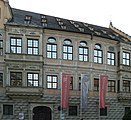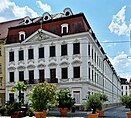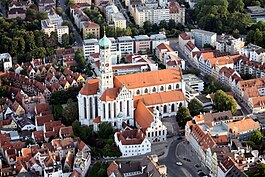
Back Augsburg AF Augsburg ALS Augsburg AN آوغسبورغ Arabic اوجسبورج ARZ Augsburgu AST Auqsburq AZ آوقسبورق AZB Augsburg BAN Augschbuag BAR
Augsburg
Ougschburg (Swabian) | |
|---|---|
|
From top: Perlachturm (left); Augsburg Town Hall (right); Maximilian Museum; Fuggerei; Augsburg Cathedral; Schaezlerpalais; and Basilica of SS. Ulrich and Afra | |
| Coordinates: 48°22′08″N 10°53′52″E / 48.36889°N 10.89778°E | |
| Country | Germany |
| State | Bavaria |
| Admin. region | Swabia |
| District | Urban district |
| Government | |
| • Lord mayor (2020–26) | Eva Weber[1] (CSU) |
| Area | |
• City | 146.84 km2 (56.70 sq mi) |
| Elevation | 494 m (1,621 ft) |
| Population (2023-12-31)[2] | |
• City | 303,150 |
| • Density | 2,100/km2 (5,300/sq mi) |
| • Metro | 885,000 |
| Time zone | UTC+01:00 (CET) |
| • Summer (DST) | UTC+02:00 (CEST) |
| Postal codes | 86150–86199 |
| Dialling codes | 0821 |
| Vehicle registration | A |
| Website | www |
Augsburg (UK: /ˈaʊɡzbɜːrɡ/, OWGZ-burg;[3] US: /ˈɔːɡz-/, AWGZ-;[4] German: [ˈaʊksbʊʁk] ⓘ; Swabian German: Ougschburg) is a city in the Bavarian part of Swabia, Germany, around 50 kilometres (31 mi) west of the Bavarian capital Munich. It is a university town and the regional seat of the Regierungsbezirk Swabia with a well preserved Altstadt (historical city centre). Augsburg is an urban district and home to the institutions of the Landkreis Augsburg. It is the third-largest city in Bavaria (after Munich and Nuremberg), with a population of 304,000[5] and 885,000 in its metropolitan area.[6]
After Neuss, Trier, Worms, Cologne and Xanten, Augsburg is one of Germany's oldest cities, founded in 15 BC by the Romans as Augusta Vindelicorum and named after the Roman emperor Augustus. It was a Free Imperial City from 1276 to 1803 and the home of the patrician Fugger and Welser families that dominated European banking in the 16th century. According to Behringer, in the sixteenth century it became "the dominant centre of early capitalism", having benefited from being part of the Kaiserliche Reichspost system as "the location of the most important post office within the Holy Roman Empire" and the city's close connection to Maximilian I.[7] The city played a leading role in the Reformation as the site of the 1530 Augsburg Confession and the 1555 Peace of Augsburg. The Fuggerei, the oldest social housing complex in the world, was founded in 1513 by Jakob Fugger.[8][9]
In 2019, UNESCO recognised the Water Management System of Augsburg as a World Heritage Site because of its unique medieval canals and water towers and its testimony to the development of hydraulic engineering.[10]
- ^ Liste der Oberbürgermeister in den kreisfreien Städten Archived 30 June 2021 at the Wayback Machine, Bayerisches Landesamt für Statistik, accessed 19 July 2021.
- ^ Genesis Online-Datenbank des Bayerischen Landesamtes für Statistik Tabelle 12411-003r Fortschreibung des Bevölkerungsstandes: Gemeinden, Stichtag (Einwohnerzahlen auf Grundlage des Zensus 2011).
- ^ "Augsburg". Lexico UK English Dictionary. Oxford University Press. Archived from the original on 11 March 2020.
- ^ "Augsburg". Merriam-Webster.com Dictionary. Merriam-Webster. Retrieved 12 August 2019.
- ^ Koristka, Thomas (22 February 2023). "Neuer Einwohnerrekord: Augsburg reißt (wieder) die 300.000er-Marke". Hallo Augsburg (in German). Archived from the original on 15 March 2024. Retrieved 12 July 2023.
- ^ "Und-wieder-5000-Menschen-mehr-Augsburg-waechst-und-waechst". www.augsburger-allgemeine.de. 17 February 2015. Archived from the original on 27 February 2015. Retrieved 28 February 2015.
- ^ Behringer 2011, p. 350.
- ^ Rollenhagen, L., Germany's Fuggerei is world's oldest social housing project, 2024, Deutsche Welle
- ^ Billock, J., After Almost 500 Years, the World’s Oldest Social Housing Complex Is Still Going Strong, Smithsonian Magazine, 2024
- ^ "Water Management System of Augsburg". UNESCO World Heritage Centre. United Nations Educational, Scientific, and Cultural Organization. Archived from the original on 6 October 2020. Retrieved 1 October 2022.










